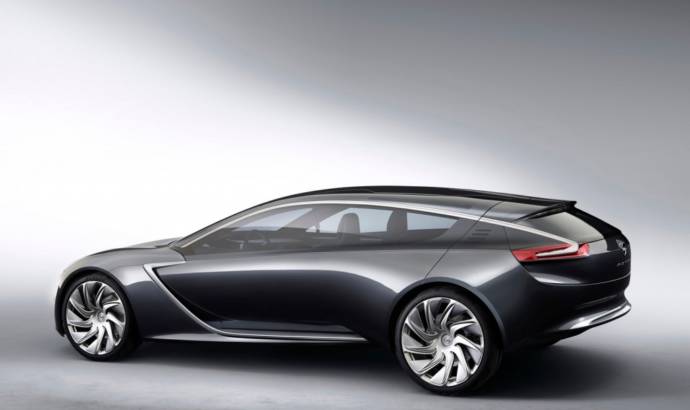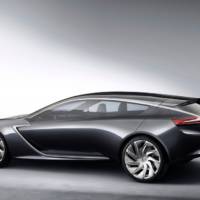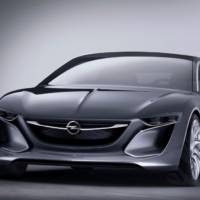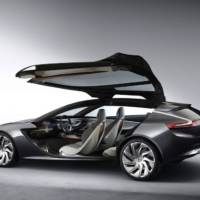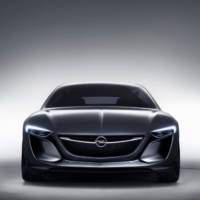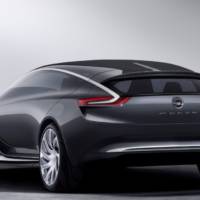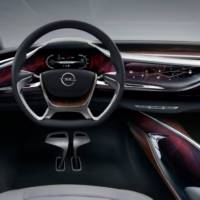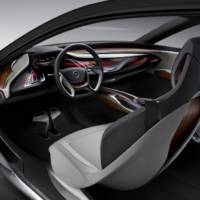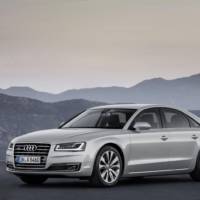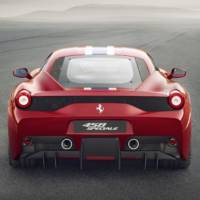A light, athletic look outside, unique projection technology inside combined with custom connectivity and modular design that enables sustainable propulsion systems par excellence – the Opel Monza Concept is stylish, ultra-modern efficiency on four wheels. It is the role-model for the next generation of Opel cars. The groundbreaking concept car makes its world premiere at the International Motor Show (IAA) in Frankfurt from September 12 – 22 (press days: September 10 – 11) and shows what people can expect from Opel in the future.
An Opel Monza already made its world premiere at the IAA back in 1977: it was a large coupé with a silky smooth-running six-cylinder engine. The Monza was in production until 1986 and has long since belonged to the elite circle of iconic cars. The new Monza Concept now follows in its wheel-tracks: The beautifully shaped hood with the distinctive center fold continues the tradition of the Monza front with the typical Opel crease. The large boomerang shaped air intakes in front of the wheel arches complement the elegant chrome bar that proudly holds the brand logo.
With the Monza Concept, the designers in Mark Adams’ team introduce a new interpretation of the sculptural design that first went into production with the Insignia. Selected distinctive lines, high-precision design and perfect sweeping contours remain the core of the evolving design philosophy called “Sculptural artistry meets German precision.”
The sculptural surfaces of the 4.69 meter-long, four seat Monza Concept are modeled after ocean waves lapping on the shore. These flowing surfaces give a look of lightness, dramatically underlined by the side-sills that taper off in front of the rear wheel arches. This unique styling element is inspired by the lean physique and slim waist of a greyhound dog, running as if on tip-toes with powerful elegance. The design of the Monza Concept’s body sides enables easy entry and egress for front and rear-seat passengers, while underscoring the prominent, sporty rear wheel arches, which share the same width as the front.
The Monza Concept continues innovating with state-of-the-art LED projection technology. Drivers no longer find the conventional individual, separate monitors that display different information; instead, they face a wide, sculpted dashboard that sweeps from door to door, and is used as a single projection surface. Information and decorative elements are displayed on the surface, which the driver can customize according to his needs, taste or mood. A total of 18 LED projectors create a continuous, adaptable multi-functional display. This is a world premiere in an automobile. Already established in the events arena, this technology has caused a sensation at major occasions such as Queen Elizabeth’s Jubilee, and Opel designers were first to think of implementing it in a passenger car. The 3D graphics are impressive, and reflect all important functions from precise vehicle and driver information to internet and communication options as well as decorative elements. Both the area displaying information and the background can be individually configured, and operation is via voice control and steering wheel controls.
The Monza Concept is based on a modular design to allow highest-possible flexibility when selecting a propulsion system. A variety of sustainable powertrains based on increasing electrification of the automobile are conceivable. For the Monza Concept to be displayed at the Frankfurt show, engineers conceived an electric drive with a CNG (Compressed Natural Gas) range extender – a further development of the Ampera’s pioneering technology. The new-generation three-cylinder 1.0 SIDI turbo – which also makes its premiere at the IAA – takes over the task as range extender. But it does so with natural gas instead of gasoline, further improving the car’s CO2 footprint. With its visionary approach, Opel continues to combine the potential of electric propulsion with the benefits of the internal combustion engine.

